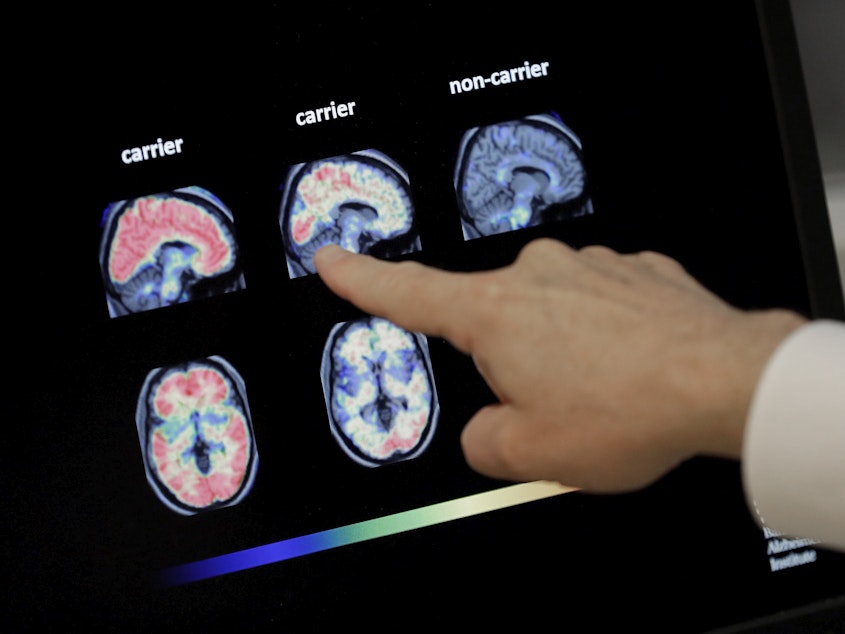The FDA Has Approved A New Alzheimer's Drug — Here's Why That's Controversial

Updated June 7, 2021 at 3:11 PM ET
The Food and Drug Administration approved the drug aducanumab to treat patients with Alzheimer's disease on Monday. It is the first new drug approved by the agency for Alzheimer's disease since 2003.
The drug is the first to show significant progress against the sticky brain plaques that are the hallmark of Alzheimer's disease.
The drug has proved highly effective at reducing the plaques, called beta-amyloid, that build up in the brains of people with Alzheimer's.
But does the drug actually slow the progression of the disease when it reduces the plaques? It's not yet clear. Two large studies offered conflicting evidence about whether the treatment slows declines in memory and thinking. A panel of expert advisers to the FDA recommended in November that the agency not approve the drug.
Sponsored
As a condition of approval, the FDA is requiring Biogen, the drug's maker, to conduct another clinical study to confirm that the reduction of amyloid plaques results in clinical improvement for patients. If the subsequent study doesn't show a clinical improvement, the agency could move to withdraw the approval.
There are also concerns that the FDA's approval will make it difficult for Biogen and Eisai, the companies marketing the drug, to find enough patients to participate in its next clinical trials as patients might not want to risk getting the placebo and can get the drug without being in a study.
The medicine will be marketed under the trade name Aduhelm.
The FDA acknowledged the controversy and attention the drug's approval has garnered from the Alzheimer's patient community, elected officials and others.
The agency opted to put Aduhelm on the FDA's accelerated approval pathway, which is meant to speed access to potentially valuable therapies for patients with serious diseases to serve an unmet need, and where a clinical benefit is expected — even if there is still some uncertainty about that benefit.
Sponsored
"[T]he Agency concluded that the benefits of Aduhelm for patients with Alzheimer's disease outweighed the risks of the therapy," Patrizia Cavazzoni, director of the FDA Center for Drug Evaluation and Research, said in a statement.
It could take several years to conclude the clinical trials the FDA is requiring. But in the meantime, Aduhelm will be available to patients.
Patients will receive the drug in monthly infusions. They will also need regular brain scans to detect a rare side effect: bleeding or swelling in the brain.
Biogen and Eisai said Monday that the annual wholesale cost for those taking maintenance doses would be $56,000 a year for a patient of average U.S. weight with mild cognitive impairment or mild dementia. The net price could change based on discounts and rebates.
Trading in Biogen shares was halted due to the announcement. After trading resumed midafternoon, shares were up more than $110, or 39%.
Sponsored
The Alzheimer's Association, which has been pushing for approval, applauded the news.
"This is the first drug that slows Alzheimer's disease. And, this is the beginning of a completely new future for Alzheimer's treatments," the group said in a statement. "This is a new type of Alzheimer's treatment; it addresses the disease in a way that has never been done before, compared to currently approved drugs."
But others say the drugmakers have not yet proved that aducanumab's benefits outweigh its risks.
In November, an FDA advisory committee of medical experts voted that the evidence did not show the drug to be effective at slowing Alzheimer's. One major study found that aducanumab slowed down the progress of Alzheimer's, while the other showed it didn't.
"Usually, you need two big studies finding the same thing to approve a drug," NPR reported after the vote last year. But at that meeting, "the FDA asked its experts to focus only on the positive study, and it also presented analysis of the data that was really very favorable to the drug. All of that did not go over well with these advisers. Some of them seemed to feel like they were being railroaded by the FDA."
Sponsored
An independent think tank also assessed the two phase 3 clinical trials of aducanumab and found the evidence "insufficient to conclude that the clinical benefits of aducanumab outweigh its harms or, indeed, that it reduces progression" of Alzheimer's disease.
Dr. Jason Karlawish, professor of medicine and medical ethics and an Alzheimer's expert at the University of Pennsylvania's Perelman School of Medicine, wrote last week that he would not prescribe aducanumab to his patients even with FDA approval, due to risks of small bleeds in the brain, financial cost and unclear benefits.
"[T]he data to make this case are murky and, even if they were clear, the drug's benefits are ambiguous at best and not worth this cost. Putting it on the market will stress Medicare's resources," he wrote. [Copyright 2021 NPR]



